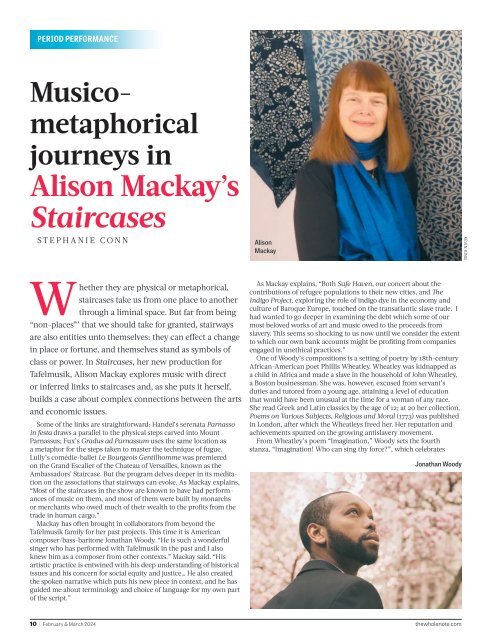Volume 29 Issue 4 | February & March 2024
Leah Roseman pandemic podcaster par excellence; Alison Mackay scrutinizes staircases for Tafelmusik; big choir, small orchestra in Dame Jane Glover's TSO Messiah; Dion(ysus) gets set to rock at Coalmine; the Sudbury /Toronto Jazz trail from an even more northerly point of view; breves are the backstory; and more.
Leah Roseman pandemic podcaster par excellence; Alison Mackay scrutinizes staircases for Tafelmusik; big choir, small orchestra in Dame Jane Glover's TSO Messiah; Dion(ysus) gets set to rock at Coalmine; the Sudbury /Toronto Jazz trail from an even more northerly point of view; breves are the backstory; and more.
Create successful ePaper yourself
Turn your PDF publications into a flip-book with our unique Google optimized e-Paper software.
PERIOD PERFORMANCE<br />
Musicometaphorical<br />
journeys in<br />
Alison Mackay’s<br />
Staircases<br />
STEPHANIE CONN<br />
Alison<br />
Mackay<br />
KEVIN KING<br />
Whether they are physical or metaphorical,<br />
staircases take us from one place to another<br />
through a liminal space. But far from being<br />
“non-places”’ that we should take for granted, stairways<br />
are also entities unto themselves: they can effect a change<br />
in place or fortune, and themselves stand as symbols of<br />
class or power. In Staircases, her new production for<br />
Tafelmusik, Alison Mackay explores music with direct<br />
or inferred links to staircases and, as she puts it herself,<br />
builds a case about complex connections between the arts<br />
and economic issues.<br />
Some of the links are straightforward: Handel’s serenata Parnasso<br />
in festa draws a parallel to the physical steps carved into Mount<br />
Parnassus; Fux’s Gradus ad Parnassum uses the same location as<br />
a metaphor for the steps taken to master the technique of fugue.<br />
Lully’s comédie-ballet Le Bourgeois Gentilhomme was premiered<br />
on the Grand Escalier of the Chateau of Versailles, known as the<br />
Ambassadors’ Staircase. But the program delves deeper in its meditation<br />
on the associations that stairways can evoke. As Mackay explains,<br />
“Most of the staircases in the show are known to have had performances<br />
of music on them, and most of them were built by monarchs<br />
or merchants who owed much of their wealth to the profits from the<br />
trade in human cargo.”<br />
Mackay has often brought in collaborators from beyond the<br />
Tafelmusik family for her past projects. This time it is American<br />
composer/bass-baritone Jonathan Woody. “He is such a wonderful<br />
singer who has performed with Tafelmusik in the past and I also<br />
knew him as a composer from other contexts.” Mackay said. “His<br />
artistic practice is entwined with his deep understanding of historical<br />
issues and his concern for social equity and justice… He also created<br />
the spoken narrative which puts his new piece in context, and he has<br />
guided me about terminology and choice of language for my own part<br />
of the script.”<br />
As Mackay explains, “Both Safe Haven, our concert about the<br />
contributions of refugee populations to their new cities, and The<br />
Indigo Project, exploring the role of indigo dye in the economy and<br />
culture of Baroque Europe, touched on the transatlantic slave trade. I<br />
had wanted to go deeper in examining the debt which some of our<br />
most beloved works of art and music owed to the proceeds from<br />
slavery. This seems so shocking to us now until we consider the extent<br />
to which our own bank accounts might be profiting from companies<br />
engaged in unethical practices.”<br />
One of Woody’s compositions is a setting of poetry by 18th-century<br />
African-American poet Phillis Wheatley. Wheatley was kidnapped as<br />
a child in Africa and made a slave in the household of John Wheatley,<br />
a Boston businessman. She was, however, excused from servant’s<br />
duties and tutored from a young age, attaining a level of education<br />
that would have been unusual at the time for a woman of any race.<br />
She read Greek and Latin classics by the age of 12; at 20 her collection,<br />
Poems on Various Subjects, Religious and Moral (1773) was published<br />
in London, after which the Wheatleys freed her. Her reputation and<br />
achievements spurred on the growing antislavery movement.<br />
From Wheatley’s poem “Imagination,” Woody sets the fourth<br />
stanza, “Imagination! Who can sing thy force?”, which celebrates<br />
Jonathan Woody<br />
10 | <strong>February</strong> & <strong>March</strong> <strong>2024</strong> thewholenote.com

















